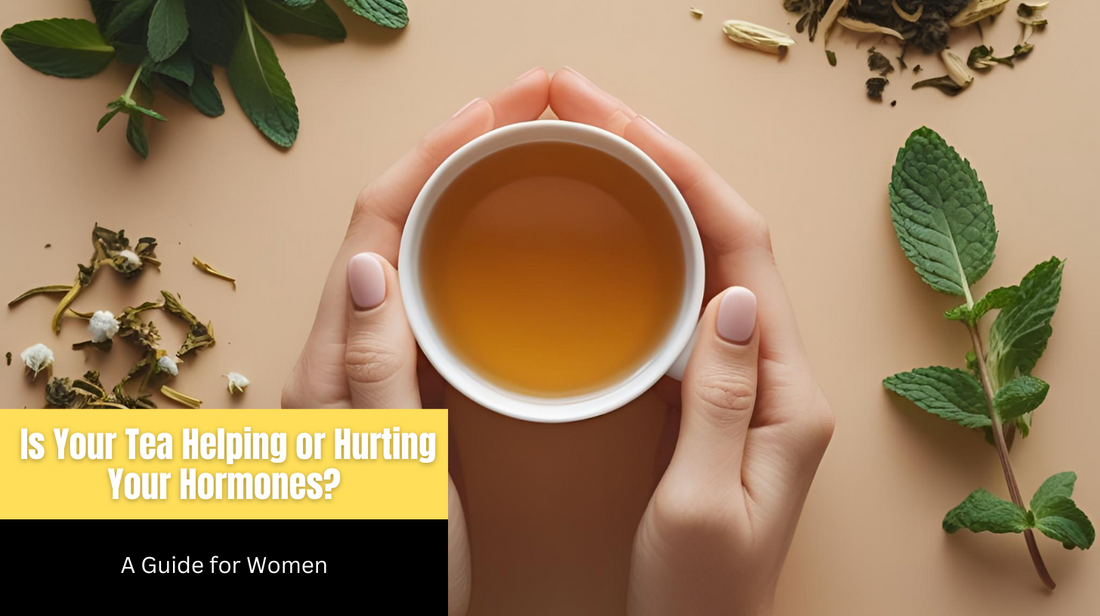
Is Your Tea Helping or Hurting Your Hormones? A Guide for Women
Sipping Your Way to Hormonal Harmony
Whether it’s PMS, PCOS, perimenopause, or just that “off” feeling, many women today are looking for natural, plant-based support to regulate their hormones. Enter: tea—a soothing daily ritual with the power to help (or hinder) your hormonal health.
But not all teas are created equal. Some can spike stress hormones. Others offer calm and balance. Let’s break it down.
Tea and Hormones: What’s the Connection?
Tea, especially herbal and traditional teas, contains natural compounds that can:

- Mimic or block estrogen (phytoestrogens)
- Calm the nervous system
- Stimulate the adrenals (like caffeine does)
-
Support liver detoxification (where excess hormones are processed)
When it comes to hormonal wellness, what you sip matters more than you think.
Caffeine: The Hormone Disruptor?
Many women struggling with hormonal issues—especially adrenal fatigue, thyroid imbalance, or estrogen dominance—are unknowingly making things worse by overdoing caffeine.
Let’s unpack how these popular teas rank for caffeine and their hormonal impact.
1. Green Tea & Hormones: Friend or Foe?
-
Caffeine Level: Moderate
Green tea contains L-theanine, a calming amino acid that can help reduce cortisol, your primary stress hormone. This makes it a good choice if you're stressed or anxious—as long as you tolerate caffeine well.
But remember: green tea does have caffeine (about 25–40 mg per cup), which could interfere with sleep or exacerbate PMS for sensitive women.
| Recommended: Mt. Pumori Best Green Tea – Smooth, antioxidant-rich Nepali green tea from high altitudes for clean energy and mental clarity. |
2. White Tea: The Gentle Hormone Helper
-
Caffeine Level: Very Low
White tea is minimally processed, preserving more antioxidants and catechins that support skin, metabolism, and estrogen balance.
It’s especially great for:
- Acne-prone skin due to hormonal shifts
- Perimenopause
-
Reducing inflammation
| Try: Silver Needle Tea – Made from the youngest buds in Ilam, this is a delicate white tea with exceptional purity and barely-there caffeine. |
3. Lemongrass Tea: Detox + Hormone Balance
-
Caffeine Level: 0 mg (Caffeine-free)
Lemongrass tea supports liver function, making it a go-to for hormone detox. It may also reduce bloating and cramps due to its anti-inflammatory properties.
For women managing PMS or PCOS, this is a herbal must-have.
| Recommended: Lemongrass Tea – Pure Nepali lemongrass, refreshing and naturally detoxifying. |
4. Masala Chai & Hormones: A Love-Hate Relationship
-
Caffeine Level: Medium to High
Chai is warming, comforting, and full of hormone-friendly spices like cardamom and cinnamon, which regulate blood sugar. But traditional masala chai is made with black tea, which contains caffeine (about 50–70 mg per cup).
If you're sensitive to caffeine, choose a caffeine-free herbal chai or drink regular chai earlier in the day to avoid disrupting sleep and cortisol rhythms.
| Try: Nepali Cardamom Spiced Tea – All the warm chai feels, lower in caffeine, high in soul-soothing spices. |
5. Tulsi (Holy Basil): The Hormone Balancer
-
Caffeine Level: None
Tulsi is an adaptogen, meaning it helps your body adapt to stress and balance hormones naturally. Ideal for women experiencing:
- Irregular cycles
- Mood swings
-
Perimenopausal symptoms
| Recommended: Tulsi Tea – Earthy and calming, ideal for hormonal and emotional balance. |
Other Herbal Teas to Support Hormones
- Chamomile Tea: Supports sleep and reduces anxiety
-
Spearmint Tea: Excellent for PCOS, known to reduce androgen levels
Try Himalayan Spearmint Tea -
Moringa Tea: A nutrient powerhouse to support menstrual regularity
Try Himalayan Moringa Tea
Teas to Avoid When Hormones Are Wacky
- Highly caffeinated black teas (especially if you're anxious or prone to insomnia)
- Flavored teas with added sugar or artificial sweeteners
- Cheap tea bags made with plastics or containing pesticide residue
Best Practices for Hormone-Friendly Tea Drinking
- Choose organic, loose-leaf teas whenever possible
- Time your tea intake: caffeine-free in the evening, energizing teas in the morning
- Don’t overdo caffeine if you're dealing with:
- PMS
- PCOS
- Adrenal fatigue
- Sleep issues
Looking for natural support to rebalance your hormones, boost energy, and calm your cycle?
Explore DanfeTea’s hormone-friendly teas now
Your body—and your hormones—deserve better than supermarket tea bags. Choose pure, organic Nepali teas grown high in the Himalayas. 🌿
FAQs
Q: Is green tea caffeine-free?
A: No—green tea contains caffeine, though less than coffee or black tea.
Q: What is the best tea for hormone balance?
A: Herbal teas like tulsi, spearmint, white tea, and lemongrass are excellent choices.
Q: Can tea replace hormonal treatments?
A: Tea can support natural hormone balance, but it’s not a substitute for medical treatment. Always consult your doctor.
Q: Is white tea good for hormones?
A: Yes! It’s low in caffeine and high in antioxidants that support estrogen balance and reduce inflammation.










